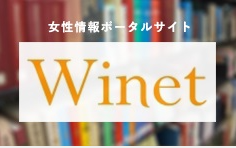Cooperation with JICA
- HOME
- International Cooperation
- Cooperation with JICA
- FY2024 Knowledge Co-Creation Program on "Promotion of Global Networking on Anti-Trafficking in Persons"
Cooperation with JICA
- Event Report
-
FY2024 Knowledge Co-Creation Program on "Promotion of Global Networking on Anti-Trafficking in Persons"
Date: October 22 (Tue) to November 21 (Thu), 2024
The National Women’s Education Center (NWEC) held a Knowledge Co-Creation Program (KCCP) course entitled “Promotion of Global Networking on Anti-Trafficking in Persons” from October 22 to November 21, 2024, commissioned by the Japan International Cooperation Agency (JICA).
Eight (8) participants from 8 countries in Africa, Europe, and Asia participated in the seminar. All of them are from ministries, police departments, and immigration bureau that engage in Anti-TIP measures. Participating countries are People's Republic of Bangladesh, Malaysia, Islamic Republic of Pakistan, Republic of the Philippines, United Republic of Tanzania, the Kingdom of Thailand, Ukraine and the Socialist Republic of Vietnam.
Overview
The seminar was a combination of an online orientation session and on-demand self-study prior to the visit to Japan for approximately 2 and a half weeks. Seminar focused on measures on prevention and protection of victims of trafficking in persons in the participating countries and Japan. It also aimed to learn from initiatives in both public and private sectors, good practices through interactive discussions.
1. Preliminary Online Program
In the online orientation, each participant presented their inception report summarizing an overview of the roles and activities of their organizations, respective duties and challenges in combatting trafficking in persons. Also, on-demand videos were available that briefly explained about the National Action Plan against trafficking in persons by the Japanese government (the Cabinet Secretariat), and roles and activities by networks for supporting migrants (Japan Network Against Trafficking in Persons (JNATIP), Thai Network in Japan (TNJ)) and Mekong Migration Network (MMN).
2. In Japan Program
November 5 to 12: Measures against trafficking in persons by the Government of Japan and NPOs
Following the program orientation, participants presented their country reports that described the current situation, challenges, and good practices against trafficking in persons in each country. While different regions have different challenges, participants confirmed the intensifying risks associated with the migration across the borders because the problem had grown its complexities due to the accelerated prevalence of the digital technology.
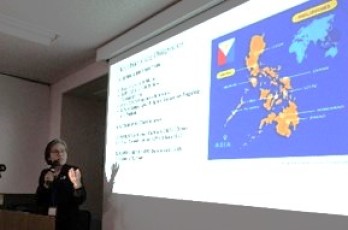 Country Report presentation by Participants
Country Report presentation by Participants
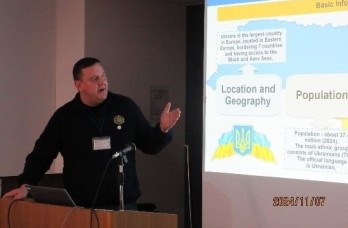
Dr. Oberoi from UN OHCHR delivered a lecture on "Cyber Scam Operations and Trafficking in Persons in Southeast Asia”. The participants actively discussed how to deal with the increasing number of victims who have been deceived into online fraud, particularly becoming conspicuous since the COVID-19 pandemic.
 Dr. Oberoi's online lecture
Dr. Oberoi's online lecture
On visit to the Cabinet Secretariat, the participants learned current situation and the government’s measures against trafficking in persons in Japan.
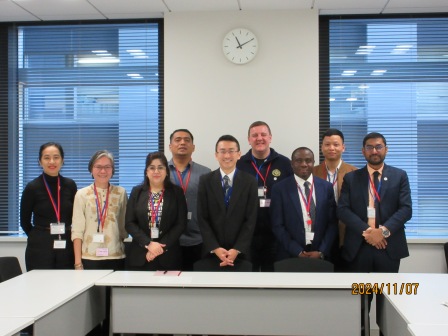 Visit to the Cabinet Secretariat
Visit to the Cabinet Secretariat
In addition to the statistics of trafficking in persons, the lecture by the National Police Agency pointed out the importance of raising awareness. Participants took interests in a budget for creating promotional videos for the general public, promotion of anonymous reporting dials, and efforts to collaborate with NGOs, diplomatic missions abroad, and private companies.
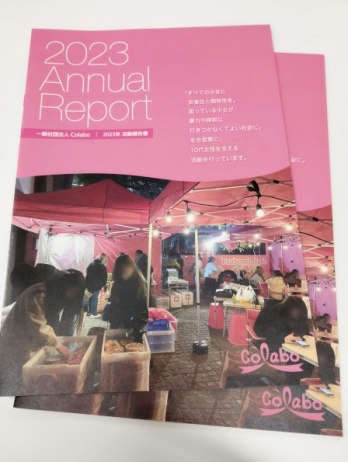
Rescue Hub, an NPO that outreach to young women facing difficulties, explained following the problem of accounts receivable at host clubs targeting young women who have left their homes due to family problems and difficulties at schools. Young women are trafficked in sex trade so as to settle the large debts. Outreach activities focuses on building rapport and trust with those young women who were not confident to seek public services. A night walking study tour with Colabo staff helped participants to see and understand the immediate needs and the importance to support young women.
Annual Report of Colabo
At the Immigration Services Agency, measures against trafficking in persons were presented, including recent cases of victim support, and took a tour of the facilities. In order to protect victims of trafficking in persons. The Organization for Technical Intern Training (OTIT) explained the roles and activities of OTIT.
The International Organization for Migration (IOM) presented the practices based on a victim-centered approach, such as the importance of assessing the safety of victims after they return home. A wide range of opinions were exchanged on the damage caused by trafficking in persons in each country, together with an interactive activity to realize our preconceived notions of victims and perpetrators of trafficking in persons.
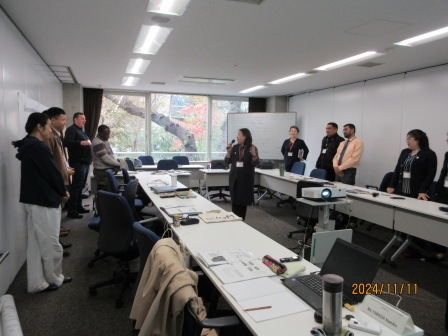 IOM lecture
IOM lecture
The Tokyo Women's Counseling and Support Center presented the support services available at the center such as medical services and assessment by psychologists and learning assistances for accompanying children of the women facing difficulties. It was explained that the center supports victims of trafficking in persons of foreign nationals in cooperation with IOM while taking into account the cultural differences such as languages and diets.
November 13 to 15: Private Sector Initiatives to Support Victims of trafficking in Persons
The participants visited a social welfare cooperation in Chiba Prefecture that supports victims of domestic violence who are both Japanese and Foreign nationals. While visiting a medium to long term shelter run by the organization for survivors of domestic violence and trafficking in persons. The founder explained her aspiration to help both Asian and Japanese children together which expanded to the various forms of survivor-centered services.
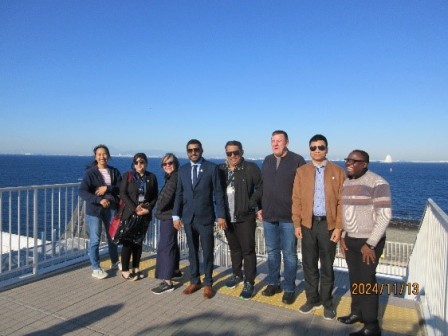 On the way to Chiba @Umihotaru
On the way to Chiba @Umihotaru
Ryoko Minagawa, an attorney lawyer of Lawyers for Trafficked Victims, who supports victims of trafficking in persons, talked about the legal framework and its practical applications to prosecute the perpetrators of trafficking in Japan. Her lecture also touched on cases of online sexual exploitation and legal support by the lawyers.
The NPO PAPS highlighted the increasing assistance needs for victims of online sexual exploitation. The participants pointed out that cooperation by the online platform companies for tackling the issues was critical, as the online exploitations aggravate its seriousness in the participating countries.
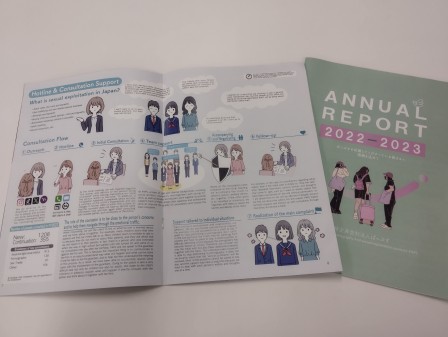 Annual Report of the NPO PAPS
Annual Report of the NPO PAPS
The general incorporated association, Social Inclusion Support Center briefed on the outlines of hotline operation by private organizations and the accompaniment support to the people who need assistance. Participants raised many questions, ranging from the establishment of specialized consultation lines and SNS consultation for disaster hit areas and multi-lingual consultation lines, along with the self-care of the staff. Solidarity Network with Migrants Japan (SMJ) explained how they raise awareness to support migrant workers facing difficulties and fund-raising action for those who were excluded from the cash transfer program for all Japanese during the COVID-19 pandemic. With regard to assistance for technical intern trainees, SMJ underscored the need for a system that protects migrant workers’ human rights and ensures a safe and secure environment when welcoming migrant workers to address domestic labor shortages.
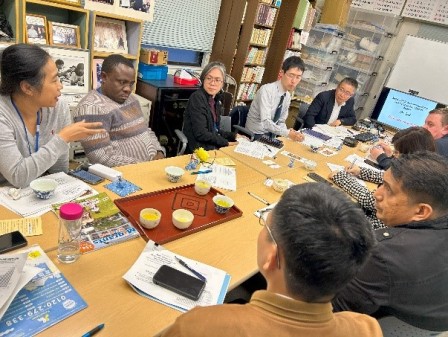 Visit to Solidarity Network with Migrants Japan (SMJ)
Visit to Solidarity Network with Migrants Japan (SMJ)
November 18 to 19: Network for Support of Migrant Workers
The lecturer by JP-MIRAI explained the multi-lingual consultations operated by the collaboration of public and private sectors, including companies and business associations to realize responsible and inclusive society for migrant workers. The lecture touched on the operation of a platform that provides information and support in building network, as well as training and learning sessions for the companies to receive migrant workers.
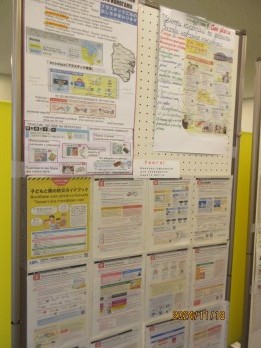
On visiting the Yokohama International Exchange Association (YOKE), the participants learnt overview of activities for promoting multicultural coexistence in the communities such as foreign language consultations, Japanese language learning support, operation of a Ukrainian cafe to provide a place for evacuees from Ukraine to exchange information in their native language with peace of mind.
Multilingual translation of the community information leaflets(YOKE)
Reiko Harima, Regional Coordinator of the Mekong Migration Network, explained the activities for protection and promotion of the rights of migrant workers in the ASEAN region. The participants discussed the responsibilities and concerns to receive large numbers of migrant workers derived from political instabilities and disasters, and reaffirmed the needs of collective actions with neighboring countries to address the issues.
November 20: Action Plan presentation
Participants presented individual action plan which underlined challenges they face in their own countries as well as the lessons learned in this program. The themes of the action plans covered a wide range of areas, including effective public awareness, protection of victims of trafficking in persons, strengthening multi-lingual support, efficient data management, inter-agency collaboration, and revision of laws and internal guidelines.
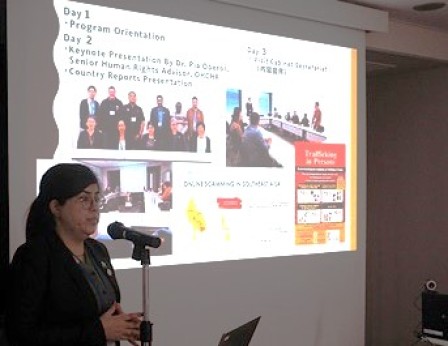 Action Plan presentation
Action Plan presentation
At the closing ceremony, each participant received a certificate of completion.
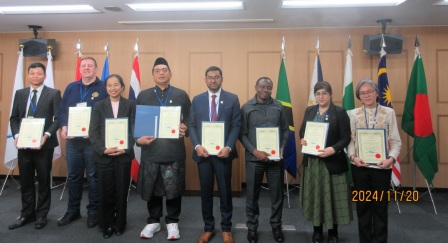 Commemorative photos at the closing ceremony
Commemorative photos at the closing ceremony
NWEC sincerely appreciate all the individuals of the relevant ministries and agencies (the Cabinet Secretariat, the National Police Agency, Immigration Service Agency, OTIT), local government (Tokyo), international organizations, private-sector support groups, experts, and networks engaged in support activities, who offered a great deal of cooperation in giving lectures, opinion exchanges, and visits for carrying out this seminar.
International Cooperation
- International Seminar
- FY2019 Seminar for Gender Equality Officers and Women Leaders in the Asia Region
- FY2018 Seminar for Gender Equality Officers and Women Leaders in the Asia Region
- FY2017 Seminar for Gender Equality Officers and Women Leaders in the Asia Region
- FY2016 Seminar for Gender Equality Officers and Women Leaders in the Asia Region
- FY2015 Seminar for Gender Equality Officers and Women Leaders in the Asia Pacific Region
- FY2014 Seminar for Gender Equality Officers and Women Leaders in the Asia Pacific Region
- FY2013 Seminar for Gender Equality Officers and Women Leaders in the Asia Pacific Region
- FY2012 Seminar for Gender Equality Officers and Women Leaders in the Asia Pacific Region
- FY2011 Seminar for Gender Equality Officer and Women Leaders in the Asia Pacific Region
- FY2010 Empowerment Seminar for Women Leaders in the Asia Pacific Region
- FY2009 Empowerment Seminar for Women Leaders in the Asia Pacific Region Final Report
- FY2008 Empowerment Seminar for Women Leaders in the Asia Pacific Region
- FY2007 Empowerment Seminar for Women Leaders in the Asia Pacific Region
- FY2006 Empowerment Seminar for Women Leaders in the Asia Pacific Region
- NWEC Global Seminar
- FY2025 NWEC Global Seminar: Addressing Technology-Facilitated Gender Based Violence (TFGBV): Approaches to Eradicate the Invisible Harm
- FY2024 NWEC Global Seminar: Gender Equality and Care
- FY2023 NWEC Global Seminar: Gender Mainstreaming & Strengthening Institutional Mechanism with Gender Perspective
- FY2022 NWEC Global Seminar: Does Digital Technology Advance Gender Equality?
- FY2021 NWEC Global Seminar: Combating Gender-Based Violence – “Building Back Better” from the Covid-19 Crisis
- FY2020 NWEC Global Seminar: Covid-19 and Gender
- FY2019 NWEC Global Seminar: Gender and Media
- FY2018 NWEC Global Seminar: Promotion of the Advancement of Women - What Japan can learn from Iceland about Gender Equality?
- FY2017 NWEC Global Seminar: Promotion for Advancement of Women Lessons from Germany
- FY2016 NWEC Global Seminar: Promotion for Advancement of Women –Lessons from Europe
- FY2015 International Symposium: Gender Equality and Women's Empowerment
- FY2014 International Symposium: Keys to Diversity and Women's Leadership
- FY2013 NWEC International Symposium:Gender Equality for Men
- FY2012 NWEC International Symposium:To Make a Society without Violence against Women a Reality
- FY2011 NWEC International Symposium
- FY2010 International Forum for Women's Empowerment
- FY2009 International Forum for Women's Empowerment
- FY2008 International Forum for Women's Empowerment Final Report3
- FY2008 International Forum for Women's Empowerment Final Report2
- FY2008 International Forum for Women's Empowerment Final Report1
- Cooperation with JICA
- FY2025 Knowledge Co-Creation Program (KCCP): "Promotion of Global Networking on Anti-Trafficking in Persons"
- FY2025 Knowledge Co-Creation Program "Eradicating Sexual and Gender-Based Violence (SGBV)"
- FY2025 Knowledge Co-Creation Program: Bangladesh “Strengthening Capacity to Address Gender-Based Violence"
- FY2024 Knowledge Co-Creation Program on "Promotion of Global Networking on Anti-Trafficking in Persons"
- FY2024 Knowledge Co-Creation Program "Eradicating Sexual and Gender-Based Violence (SGBV)"
- FY2023 Knowledge Co-creation Program "Promotion of Networking among ASEAN Countries on Anti-Trafficking in Persons”
- FY2023 Knowledge Co-Creation Program "Eradicating Sexual and Gender-Based Violence (SGBV)"
- FY2022 Knowledge Co-creation Program "Promotion of Networking among ASEAN Countries on Anti-Trafficking in Persons”
- FY2022 Knowledge Co-Creation Program "Eradicating Sexual and Gender-Based Violence (SGBV)"
- FY2021 Knowledge Co-creation Program "Promotion of Networking among ASEAN Countries on Anti-Trafficking in Persons”
- FY2020 Knowledge Co-creation Program "Promotion of Networking among ASEAN Countries on Anti-Trafficking in Persons”
- FY2019 Knowledge Co-creation Program "Promotion of Networking among ASEAN Countries on Anti-Trafficking in Persons”
- FY2018 Knowledge Co-creation Program "Promotion of Networking among ASEAN Countries on Anti-Trafficking in Persons”
- Issue-specific Training “Seminar on Promotiom of Networking among ASEAN Countries on Anti-Trafficking in Persons”
- Basic Information-Gathering Survey/Workshop Seminar on the Economic Independence for Women in Central America and the Caribbean (El Salvador/Dominican Republic)
- Regional Gender Seminar in Central and South America
- 2015 Issue-specific Training "Seminar on Promotion of Networking among Asian Countries on Anti-Trafficking in Persons"
- Seminar on the Promotion of Education for Girls and Women II
- International Conference/International Exchange
- Online meeting with Seisen International School elementary students
- Visitor: Mansfield Fellows
- Visitor:JICA Knowledge Co-Creation Program (KCCP) on "Women's Empowerment through Business for Central American Integration System (SICA) Member Countries"
- The 68th Session of the Commission on the Status of Women
- Visitor: Madam Sustjie Mbumba, First Lady of the Republic of Namibia
- Workshop of commemorating the donation of the Beate Shirota Gordon archive materials
- Meeting with Korean Women’s Development Institute (KWDI)
- The Coalition of Finnish Women's Associations (NYTKIS) Secretary General Ms. KAKKOLA’s Courtesy Call to Foreign Minister KAMIKAWA
- The Coalition of Finnish Women's Associations (NYTKIS) Secretary General Ms. KAKKOLA’s Japan Visit Program
- The 67th Session of the Commission on the Status of Women
- NGO CSW67 Forum
- Webinar with Korean Women’s Development Institute (KWDI)
- The 66th Session of the Commission on the Status of Women (Hybrid format)
- Online meeting with international graduate students from the Appropriate Technology course at the University of Tsukuba
- The 65th session of the Commission on the Status of Women
- Lecture "The Beate Sirota Gordon Archives at Mills College"
- Participation in 2nd AGenT
- The 64th session of the Commission on the Status of Women
- Dr. Wang from National Taiwan University visits NWEC
- Japan Network of Women Engineers and Scientists and The Japan Inter-Society Liaison Association Committee for Promoting Equal Participation of Men and Women in Science and Engineering: 9th Japan Korea China Women Leaders Forum for Science & Technology
- Researcher from the KWDI visits NWEC
- Visit by a delegation from the Socialist Republic of Vietnam Ministry of National Defense
- Briefing on the Reykjavik Index for Leadership
- Women's Archives Center Exhibition "Beate Sirota Gordon and gender equality in Japanese Constitution"
- Visit from the Guangxi Women’s Federation
- Participation in the 63rd Session of the Commission on the Status of Women
- 7th Global Forum on Gender Statistics
- FY2018 International Symposium hosted by Korean Institute for Gender Equality Promotion and Education “Gender Equality at Schools”
- Visit from All-China Women’s Federation(ACWF)
- Participation in the 62nd Session of the Commission on the Status of Women
- The 14th KIGEPE International Symposium “Empowering Women’s Leadership: expanding influence and innovation”
- Participation in the 61st Session of the Commission on the Status of Women
- Visit from the Batis Center for Women
- 2011 Asia Women Eco-Science Forum (a forum of science and engineering leaders in Japan, China and Korea)
- The 60th Session of the Commission on the Status of Women
- The 59th Session of the United Nations Commission on the Status of Women
- The 58th Commission on the Status of Women
- The 57th Session of the United Nations Commission on the Status of Women
- International Symposium: Gender Awareness Education for Sustainable Development
- Thirtieth Anniversary Programs
- Attendance at the Ceremony Commemorating the 25th Anniversary of the Korean Women’s Development Institute (KWDI)
- Japanese-Filipino children (JFC)* from the Philippines-based NGO “DAWN” visit the Center
- Visitors from Abroad to NWEC
- Research report on Multicultural Family Support in South Korea
- Workshop on Gender and Education: Life-long Learning for Women’s Empowerment
- Lecture Delivered by a Visiting Researcher
- Connections: Bringing Together the Next Generation of Women Leaders in Science, Technology, Engineering and Mathematics
- Conclusion of Memorandum of Understanding on Exchange and Cooperation with the Ministry of Women's Affairs, Royal Government of Cambodia
- Visit to Japan by the Minister of Women’s Affairs of the Royal Government of Cambodia
- KIGEPE Delegation Visit
- Officials of Ministry of Information and Communications of the Socialist Republic of Vietnam visited NWEC
- The 56th Commission on the Status of Women
- Dr. Barker's visit
- Multidisciplinary Intellectual Exchange for Women Leaders from the United States, Japan, South Korea and the Philippines
- Courtesy visit to University of Hawai`i
- Delegation of Board for the Advancement of Women, Ministry of Finance of the Socialist Republic of Vietnam visited NWEC
- Visit Korean Women's Development Institute (KWDI)
- Report on Participation in the 5th World Social Forum on Migration
- A group led by the Vice President of the Korean Women's Development Institute visited NWEC
- A disaster management specialist from India visits the Center
- Visit to the Korean Institute for Gender Equality Promotion & Education (KIGEPE) and others
- Secretary of State, Ministry of Justice, Kingdom of Cambodia visited NWEC
- Research conducted in the Republic of the Philippines
- Research on the Comparative Study of the Gender Equality Policy in Southeast Asian Countries in the Kingdom of Cambodia
- Ochanomizu University and A Canadian Women’s Study Researcher visited NWEC
- Aigyung Yang, Research Fellow and Former Director of Strategy Board for Women Friendly Policies of the Korean Women's Development Institute (KWDI) Visits NWEC
- Delegation of the Ministry of Defense of the Socialist Republic of Vietnam visited NWEC
- Delegation from the Women and Development Center, of the Vietnam Women's Union, Visited NWEC
- The "7th Asia-Pacific Forum on Development and Gender" was held in Seoul, South Korea
- HOME
- International Cooperation
- Cooperation with JICA
- Cooperation with JICA
- FY2024 Knowledge Co-Creation Program on "Promotion of Global Networking on Anti-Trafficking in Persons"

